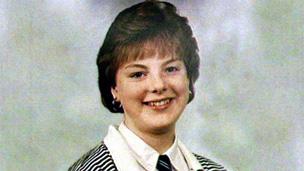Leveson Inquiry: Scots mother critical of press
- Published
Margaret Watson: "Just because a person's deceased you can write what you want"
The mother of a boy who killed himself after reading derogatory articles about his dead sister has urged journalists "to look into the facts".
Margaret Watson told the Leveson Inquiry into press ethics that her son Alan "could take no more".
The Herald newspaper and Marie Claire magazine published pieces which the Watsons believed had besmirched their 16-year-old daughter's name.
Diane Watson was killed at Whitehill Secondary in Dennistoun in 1991.
Her 15-year-old killer Barbara Glover was convicted just months after the murder and sent to Kerelaw Secure Unit.
Eighteen months after their daughter's death, Mrs Watson and her husband Jim suffered the loss of their only other child, 15-year-old Alan.
The couple told the inquiry at the High Court in London that he was found dead with cuttings of the offending articles in his hand.
Mrs Watson was highly critical of Herald journalist Jack McLean whom she claimed had used Diane's case to "spearhead a campaign" into the treatment of young offenders.
She told the inquiry: "Journalists should have all the facts and not cause other tragedies to take place."
During evidence to the inquiry, which lasted 35 minutes, the Glasgow woman said Mr McLean's articles had painted the murderer as the victim.
Mrs Watson said: "He [Mr McLean] said we came from an upper working class background and Diane had looked down on Barbara with disdain."
She added that the journalist had no right to paint Diane in the way that he did.
"We didn't have a memory left of her because of people like him [Mr McLean]," said Mrs Watson.
She explained to the inquiry that she received no apology from The Herald or from Mr McLean and it took more than a year to receive an apology over the Marie Claire magazine article.
Mrs Watson said that she believed there was "no doubt" that the articles contributed directly to her son committing suicide.
Freelance columnist
Responding to the evidence, The Herald & Times Group, which publishes The Herald, said it deeply regretted "any action which added to the Watson family's grief over the tragic loss of their daugher and later their son".
The statement added: "The columns were published some 20 years ago when the group was under different ownership and editorial control and the freelance columnist involved has not worked for the company for some years."
In a statement, Marie Claire magazine said: "Mrs Watson refers to an article published in Marie Claire in September 1992 about British children serving life sentences.
"A subsequent meeting with Mrs Watson led Marie Claire to publish a clarification in April 1993, apologising clearly for the family's distress as a result of the original article and explaining the background to the sources used."
The Watsons are now campaigning to have the law changed to make it an offence to defame the deceased.
Mrs Watson said the Scottish government was consulting on the proposal, external and she urged the UK government to do the same for England and Wales.
Currently the law does not protect the reputations of the dead, who cannot be defamed.

Diane Watson was murdered at school in 1991
Mrs Watson was also critical of the Press Complaints Commission which she said "wasn't interested in what we had to say". She called for it to be axed and and for it to be replaced by an independent body or tribunal.
Written evidence to the inquiry on behalf of the Watsons, external said: "The toll of these events upon parents Margaret and James Watson cannot be overstated and include serious illness.
"Nevertheless, over the years they have made considerable efforts to secure retractions and apologies from the Glasgow Herald and Marie Claire, as well as seeking a change in policy, regulation and/or the law relating to convicted criminals being able to profit from publishing accounts of their crimes."
The submission added that Mr and Mrs Watson had:
direct contact with the newspaper and the magazine
complained to the Press Complaints Commission
contacted their own MP and MEP
engaged in correspondence with the Scottish and Home Offices, the Scottish Parliament Committee's Justice Committees and the European Commission of Human Rights
and lodged a petition with the Scottish Parliament on 10 May, 2002, regarding wider policy issues.
Previously, Mr McLean had stated that his writing was based on contact with the solicitors and counsel for both the defence and prosecution, as well as doctors, teachers and local people involved with both families.
Prime Minister David Cameron set up the Leveson inquiry after the News of the World admitted intercepting voicemail messages of prominent people to find stories.
The probe has two parts - the first is to examine relations between the press, politicians and police and the second will look at the extent of unlawful or improper conduct within News International and other media organisations.
It will also examine the way in which any relevant police force investigated allegations relating to News International, and whether the police received corrupt payments or were otherwise complicit in misconduct.